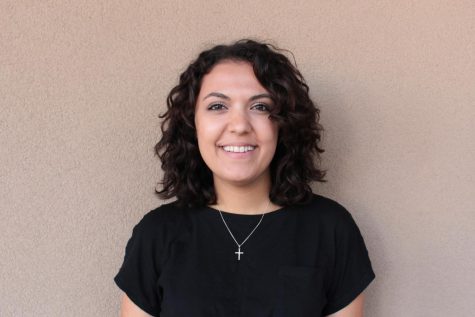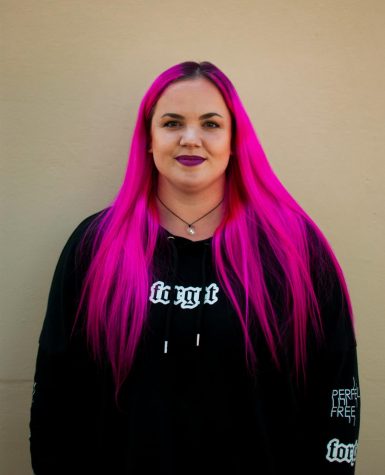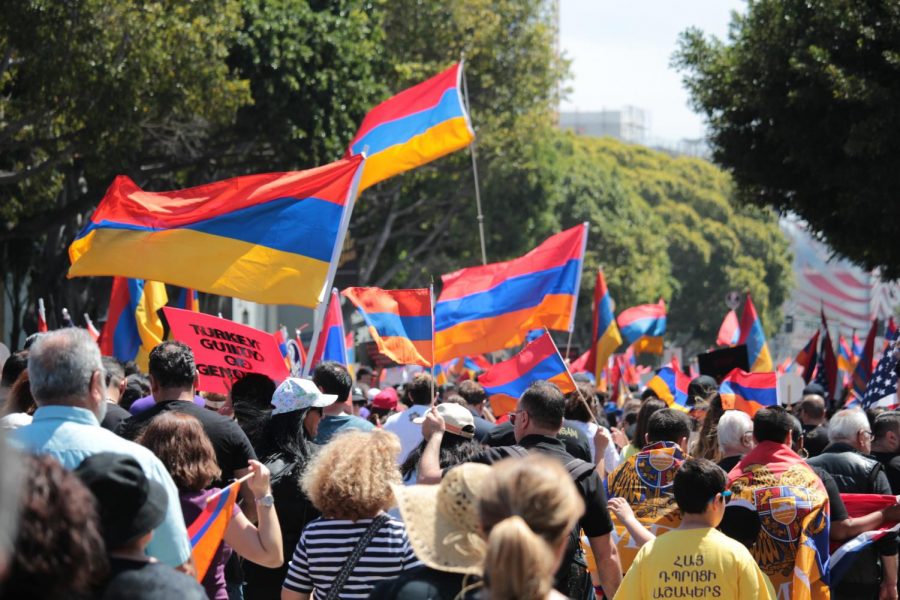The Lost Meaning
Fighting for justice, neglecting other issues
Los Angeles-based Armenian-Americans rally in 2018 for recognition of the Armenian Genocide of 1915.
Back then.
I always picked white carnations to take with me to Tsitsernakaberd. My choice of flowers somewhat gave me hope that one day the innocent souls will receive their justice, that my country will obtain its peace, and that the story will live on. I believed that for as long as we continue to commemorate, respect and remember what happened to the 1.5 million Armenians, the story will never die, never repeat and will never be taken for what it isn’t.
As we walked through the long passageway stretching through three hills leading up to the Armenian Genocide Memorial in Yerevan, opera music played on the loudspeakers in the background, giving the whole experience a little more of an emotional, melancholy tone. Everyone brought along their kids, friends and families. It had become an unspoken tradition, everyone attended.
Upon reaching the top of the hill, there it is, an architectural masterpiece, which has brought millions of people together, to carry on the message; to remember. The infinite fire is in the center, and is surrounded with 12 slabs of concrete, each one representing a region of Western Armenia that was lost to current day Turkey. Now imagine being in the center of it all. The large slabs lean in towards you, as if they’re calling your name to return home. The feeling is unimaginable, the experience is out of this world.
Everyone brought flowers. There was something different about the way the mourners held them. They held them facing down. That meant something. Perhaps it was the humbleness and resiliency of the Armenian people throughout the years. The willingness to remember and tell the story of the lost, without changing the purpose of the day. Just a small thing, with so much power and a big message behind it.
As I stood in the midst of it all and observed everything, I thought of the people, the events, the future. Chills covered my body and tears ran down my cheeks. And that very moment, I realized why I was there, what my purpose was.
I was put on this earth to tell a story of the people, who didn’t get a chance to do it for themselves.
That was eight years ago.
For the past eight years, I’ve boycotted the genocide commemoration events here in Los Angeles. All for a reason I wasn’t able to fully comprehend up until this year. Just last week, I gave it another go, almost wishing I hadn’t.
The first time I attended was exactly 19 days after our big move to the United States from Armenia. I remember my first impression of it all. Dumbfounded. I was dumbfounded. At first I felt proud to have so many Armenians and foreigners gathered in an adopted land, for one cause and that was to gain recognition. The pride was followed by excitement to see and meet people so eager in the new country.
Then came confusion. People were happy, and singing and dancing, as if they were celebrating something. A light atmosphere during such an event, created specifically to remember and respect the dead, was so strange for me. It was beyond everything I ever imagined back at home.
“Turkey run, Turkey hide, Turkey’s guilty of genocide,” everyone chanted. I didn’t know what that meant back then, I didn’t speak English too well, but that’s another story.
Instead of holding down flowers, people held up signs and posters, demanding Turkey to admit the guilt of the Armenian Genocide, and for the United States to recognize it. I couldn’t help but wonder how ‘recognition’ was going to change the 1915 events. I also wondered if this was going to affect current day Armenia or Armenians.
As Armenia goes through a huge political change; a revolution, I continue to wonder why I am not seeing as many people at rallies to support their people currently fighting for their lives, for their freedom, but I was seeing so many of them clinging onto past events.
I think that genocide recognition is a wonderful mission to have on the agenda of Armenian communities worldwide, but when one does that at the cost of being ignorant to similar events taking place at the time being, it discredits the person fighting for whatever happened 100 years ago.
This year, though, my dislike and embarrassment became stronger as I chanted and marched along with the people to the same destination as eight years ago, repeating the same chants as eight years ago. Asking for the same things as eight years ago.
As we completed the mile and a half walk to the Turkish Consulate in Los Angeles, we were welcomed by a huge crowd, a large stage and lots and lots of people dancing. Yes, dancing. Moving their bodies along with the tunes of Armenian patriotic songs. I was happy to see this, I joined. It wasn’t too long until I remembered that I was not there to party, but to commemorate. I also remembered that April 24 is one day out of the year, where people need to just take and mourn, to really remember.
It’s strange to say, but I was there to be sad. I was there to quietly remember and mourn the lost lives, the lost lands, the side of my country I will never get to see.
On my drive home, I couldn’t help but think about all the things we had failed at.
Somewhere between the lines, the true message of this day was lost, and the day turned into a social event of dancing and driving around, obnoxiously blasting music in cars, honking the entire drive, making it seem like a wedding rather than what it really is. Allowing politicians to take the stage to show their ‘support,’ in order to receive the support of the attendees.
The thing is, genocide is a complicated, sensitive topic for us Armenians, and nobody really talks about it. All the things we have done wrong, and all the things we are good at, make us who we are. All I know that we have failed at showcasing our history to the world by covering the tragedy with abhorrent acts. We have done it so much, to the point where non-Armenians ask questions like, “When are you celebrating the Armenian Genocide?”
My message to those of us who ‘celebrate’ is one:
“If you’ve ever been to Tsitsernakaberd, you’d never celebrate genocide.”
Marian Sahakyan can be reached at [email protected]

Growing up in a big family of journalists and writers, Marian developed her love for writing and reporting since early childhood. She is often found in...

Belinda Oldrati is an international student from Sweden, and one of the Production Editors of El Vaquero newspaper. She studies Journalism, TV Production,...

